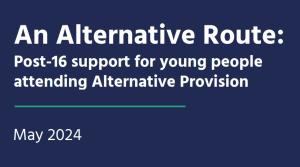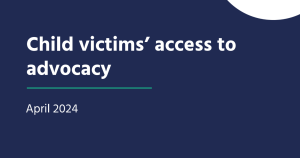The Department for Education (DfE) has today published the Special Educational Needs and Disabilities (SEND) and Alternative Provision Improvement Plan (hereafter the Plan). The Plan sets out how DfE intends to deliver ‘a single national system that delivers consistently for every child and young person with SEND and in alternative provision’. The review of the SEND system created an opportunity to identify how the whole system can work together more effectively to realise children’s ambitions and improve the experiences of every child.
For the review to be successful it needed to have children’s voices at its heart which is why I supported children and young people with additional needs to contribute to the consultation directly, alongside analysis of Education, Health, and Care Plans (EHCPs) and review of the children represented by my Help at Hand team.[ii][iii] I have also spent much of 2022 investigating the reasons why children struggle to attend school regularly, and through that work heard from children with SEND as well as their parents and the practitioners working with them.[iv][v] The message from children was clear, they are extremely ambitious and passionate, yet often the system around them fails to mirror their ambition and instead uses labels as an excuse for poorer outcomes or exclusion from opportunities children without SEND take for granted.
Learning from what children told me, I set out three over-arching ambitions through my paper, Beyond the Labels: A SEND system which works for every child every time[vi]:
- To ensure all children and young people get support that reflects their ambitions.
- To ensure that all children are getting timely and effective support, locally, with a focus on early intervention.
- To ensure that all children have consistent, excellent experiences wherever they are in the system.
I believe that only by meeting these ambitions will we see children with SEND supported to achieve the outcomes they are capable of. Delivering these ambitions requires a huge effort from across the entire system, joining up with the DfE’s Children’s Social Care Strategy ‘Stable Homes, Built on Love’[vii], as well as the Department for Health and Social Care (DHSC).
The Plan goes some way to setting out a roadmap for meeting these ambitions and I am pleased that many of the recommendations I made to the DfE in response to the Green Paper[viii] have been reflected in the Plan. In particular, my call for Education Health and Care Plans (EHCPs) to be digitised is reflected, to improve their quality and make them more useful for young people.
I am also particularly pleased by this plan’s focus on early help for families, many of whom face long, bureaucratic processes to get support for their child. My hope is that this, in addition to the increase in specialist school places, will help prevent families from reaching breaking point.
However, there are serious gaps in the Plan, particularly concerning support for looked after children with additional needs, which I believe need to be urgently addressed. Much of the Plan assumes that children will have familial support and does not consider how children in the care of the state will be represented and supported.
I am also concerned that the Plan does not go far enough swiftly enough. The DfE identify in the Plan a vicious cycle of late intervention, low confidence and inefficient resource allocation that drives the challenges plaguing the system. With much of the Plan being delivered by the end of 2025, we have two more years of children being fed into this cycle with the commensurate poor outcomes that has necessitated this review in the first place. Whilst it is right to be evidence led and provide time for co-design of major reforms, such as the National Standards, with the children they will impact, we must also consider the needs of children now.
It is now incumbent upon everyone involved in the system supporting children with SEND to get this right, so that we can finally realise a system that is as ambitious for children as they are for themselves. This iteration of the Plan will enable significant positive reform. However, I hope to see the DfE considering the gaps and I will continue to work with them, representing the needs of children whose voices are so seldom heard to ensure that all children are able to benefit equitably from the reforms.





